- Back to Home »
- Cut off aid to Egypt till elections held
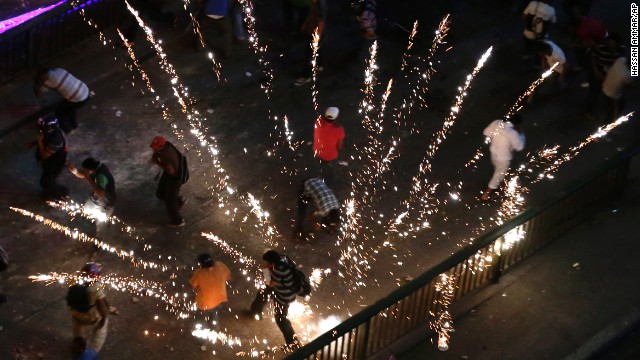 Supporters and opponents of Egypt's deposed President Mohamed Morsy clash in Cairo on Friday, July 5. Fighting erupted Friday night between hundreds of protesters, with the two sides facing off on a bridge, raising fears of widening violence after the military ousted the country's first democratically elected president. View photos of protests that erupted before the coup.
Supporters and opponents of Egypt's deposed President Mohamed Morsy clash in Cairo on Friday, July 5. Fighting erupted Friday night between hundreds of protesters, with the two sides facing off on a bridge, raising fears of widening violence after the military ousted the country's first democratically elected president. View photos of protests that erupted before the coup. 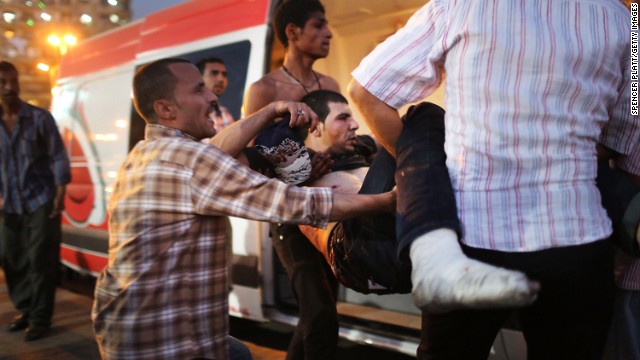 A protester is attended to in Cairo's Tahrir Square during fighting between the pro- and anti-Morsy crowds on July 5.
A protester is attended to in Cairo's Tahrir Square during fighting between the pro- and anti-Morsy crowds on July 5. 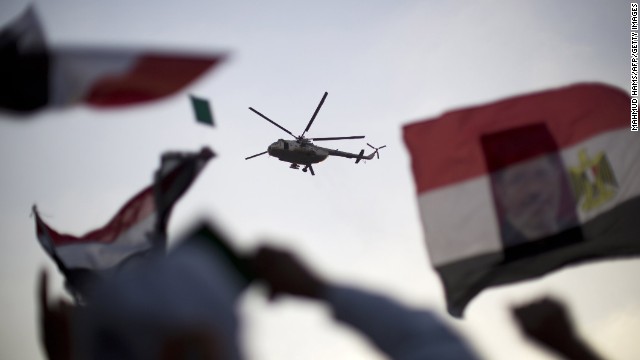 An Egyptian military helicopter hovers over supporters of the Muslim Brotherhood and deposed President Mohamed Morsy in Cairo on July 5.
An Egyptian military helicopter hovers over supporters of the Muslim Brotherhood and deposed President Mohamed Morsy in Cairo on July 5. 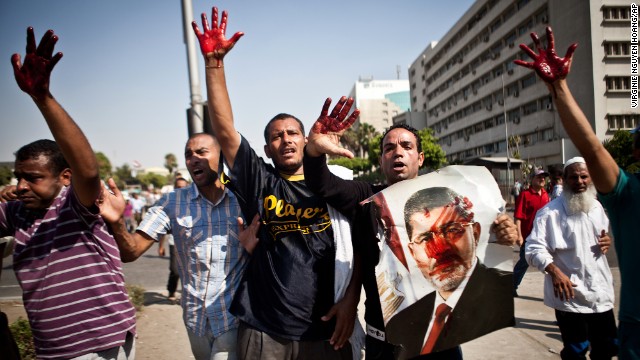 Morsy supporters hold up their bloodstained hands after Egypt's armed forces opened fire on rally in front of the Republican Guard headquarters in Cairo on July 5.
Morsy supporters hold up their bloodstained hands after Egypt's armed forces opened fire on rally in front of the Republican Guard headquarters in Cairo on July 5. 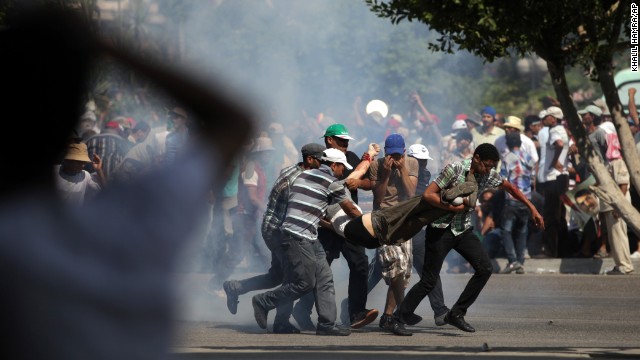 Morsy supporters carry a man who was shot during clashes next to the Republican Guard headquarters in Cairo on July 5. State broadcaster Nile TV said a number of those backing the deposed leader were wounded as they tried to storm the headquarters, where Morsy reportedly was being held.
Morsy supporters carry a man who was shot during clashes next to the Republican Guard headquarters in Cairo on July 5. State broadcaster Nile TV said a number of those backing the deposed leader were wounded as they tried to storm the headquarters, where Morsy reportedly was being held. 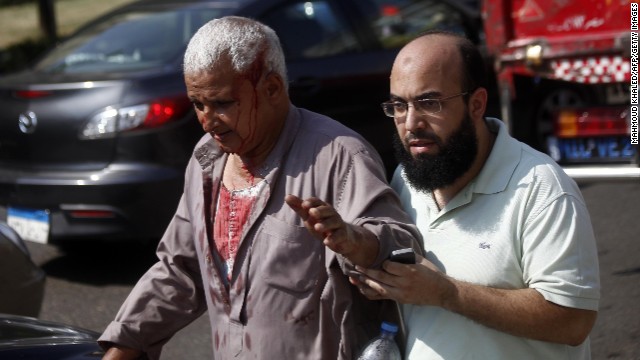 A wounded man is helped following the gun battle outside the headquarters of the Republican Guard on July 5.
A wounded man is helped following the gun battle outside the headquarters of the Republican Guard on July 5. 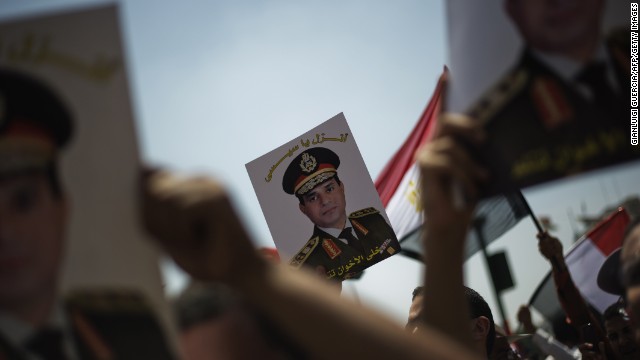 Egyptians hold portraits of Gen. Abdel-Fatah El-Sisi reading "Come down, Sisi" as they gather in Cairo's landmark Tahrir Square on July 5.
Egyptians hold portraits of Gen. Abdel-Fatah El-Sisi reading "Come down, Sisi" as they gather in Cairo's landmark Tahrir Square on July 5. 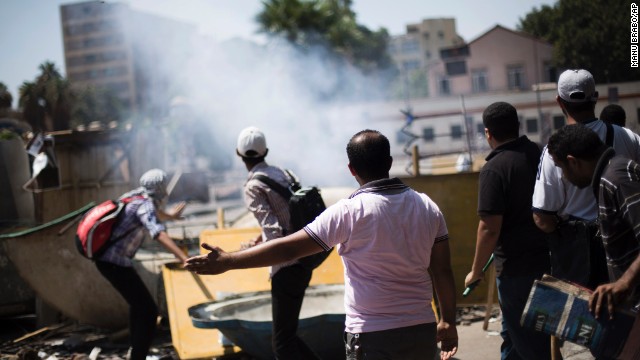 Morsy supporters react to an explosion during clashes with police officers on July 5 outside Cairo University in Giza.
Morsy supporters react to an explosion during clashes with police officers on July 5 outside Cairo University in Giza. 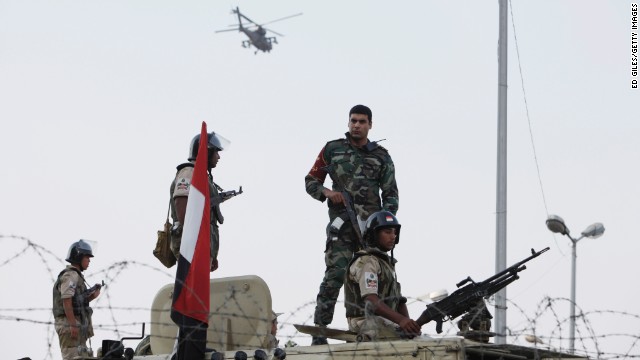 Egyptian Army soldiers stand guard at the Cairo headquarters of the Republican Guard on July 5 as an Apache attack helicopter flies overhead.
Egyptian Army soldiers stand guard at the Cairo headquarters of the Republican Guard on July 5 as an Apache attack helicopter flies overhead. 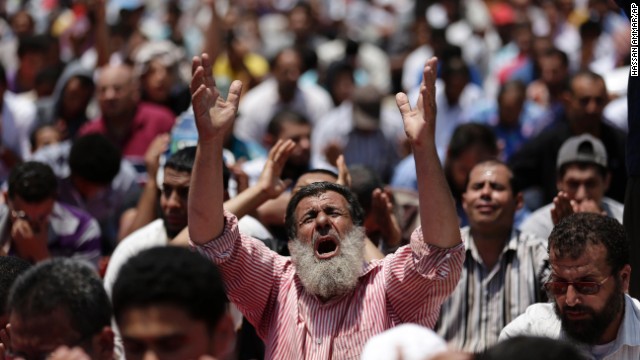 Morsy supporters pray near the University of Cairo in Giza on July 5.
Morsy supporters pray near the University of Cairo in Giza on July 5. 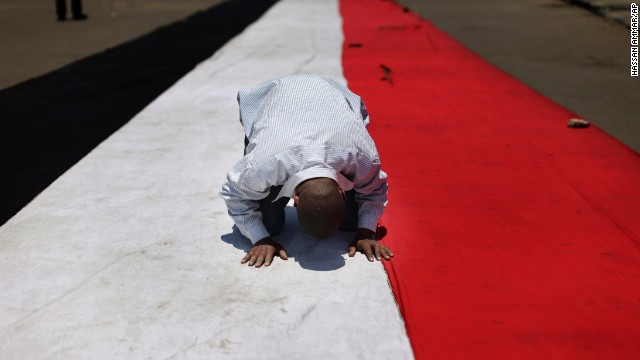 A man prays on July 5 before the protest near the University of Cairo.
A man prays on July 5 before the protest near the University of Cairo. 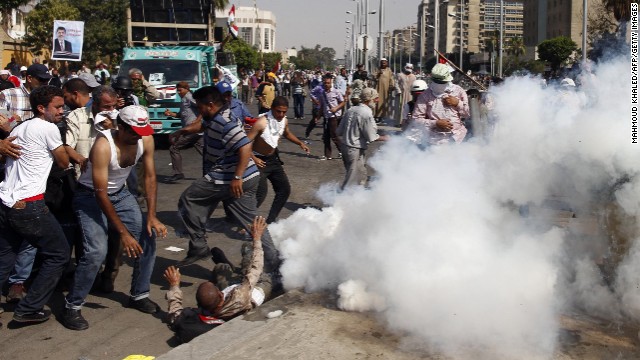 Protesters take cover from tear gas during clashes outside the headquarters of the Republican Guard in Cairo on July 5.
Protesters take cover from tear gas during clashes outside the headquarters of the Republican Guard in Cairo on July 5.  A military helicopter flies by Egypt's Presidential Palace in Cairo on July 5.
A military helicopter flies by Egypt's Presidential Palace in Cairo on July 5. 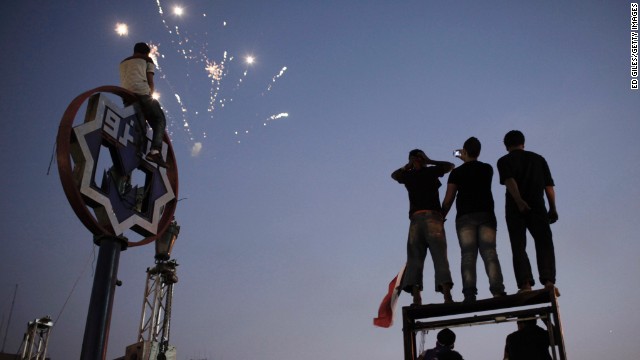 Egyptians watch fireworks in Tahrir Square on Thursday, July 4, the day after Morsy's ouster.
Egyptians watch fireworks in Tahrir Square on Thursday, July 4, the day after Morsy's ouster. 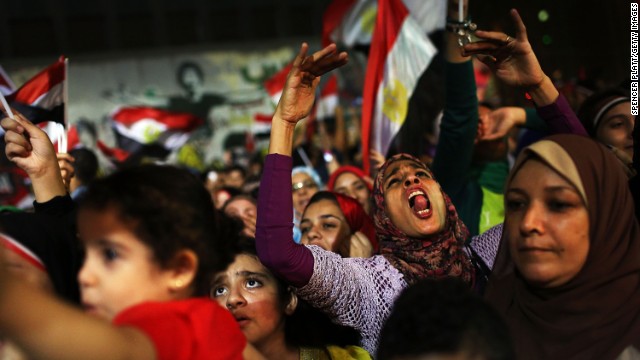 People dance and cheer in the streets of Cairo on July 4.
People dance and cheer in the streets of Cairo on July 4. 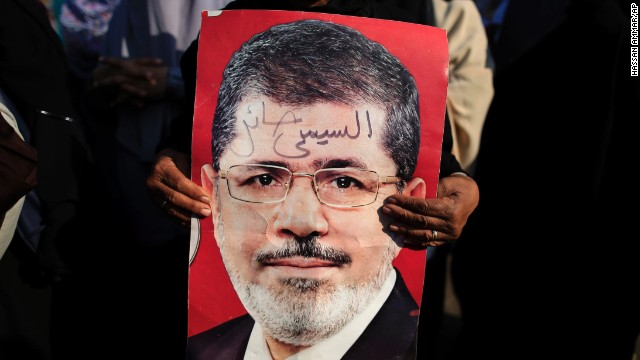 A government supporter holds a poster of Morsy during a July 4 rally in Nasr City.
A government supporter holds a poster of Morsy during a July 4 rally in Nasr City. 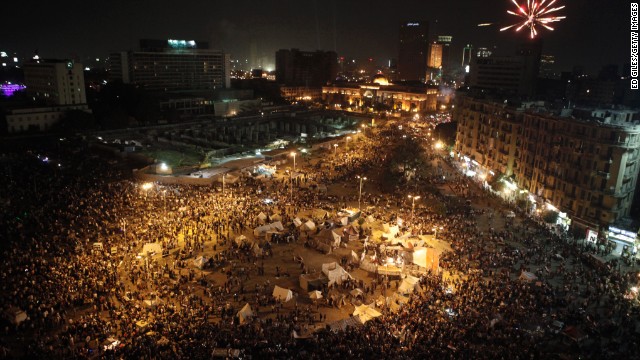 A massive crowd gathers in Tahrir Square on July 4.
A massive crowd gathers in Tahrir Square on July 4. 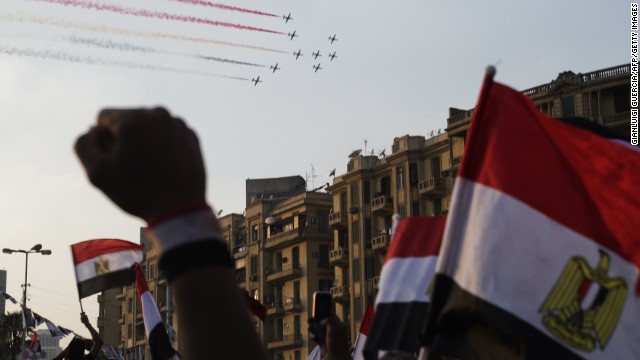 Egyptians cheer and wave national flags as airplanes fly above Tahrir Square on July 4, leaving a trail of smoke in the colors of the national flag.
Egyptians cheer and wave national flags as airplanes fly above Tahrir Square on July 4, leaving a trail of smoke in the colors of the national flag. 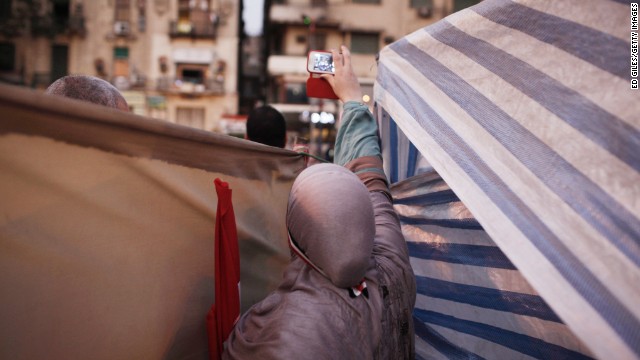 A woman uses a mobile phone to record the July 4 celebrations in Tahrir Square.
A woman uses a mobile phone to record the July 4 celebrations in Tahrir Square. 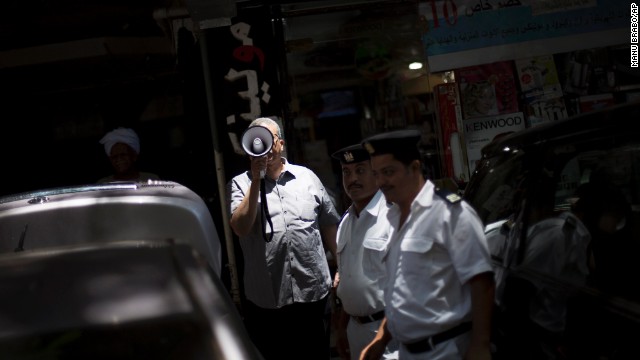 An opposition protester chants slogans against Morsy near Cairo University, where Muslim Brotherhood supporters gathered on July 4 to show support for the ousted president.
An opposition protester chants slogans against Morsy near Cairo University, where Muslim Brotherhood supporters gathered on July 4 to show support for the ousted president. 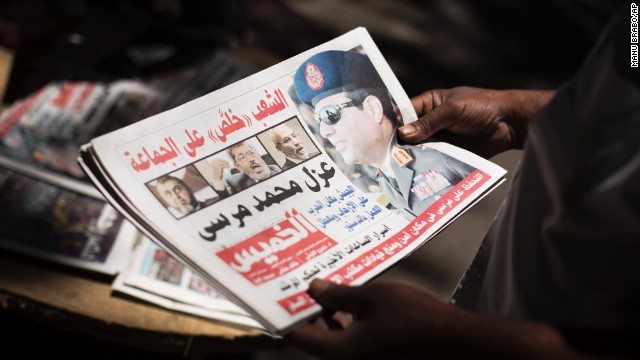 A man holds a newspaper near Mesaha Square in Cairo on July 4.
A man holds a newspaper near Mesaha Square in Cairo on July 4. 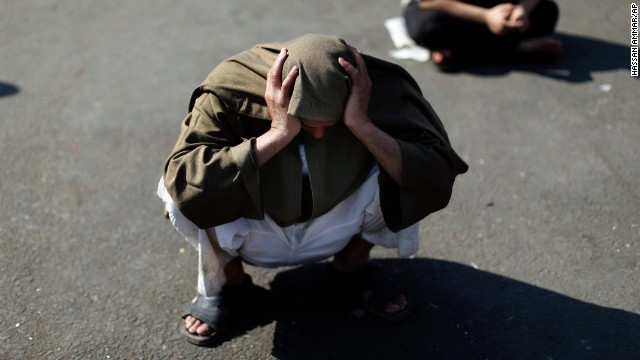 Dejected Morsy supporters attend a rally in Nasr City on July 4.
Dejected Morsy supporters attend a rally in Nasr City on July 4. 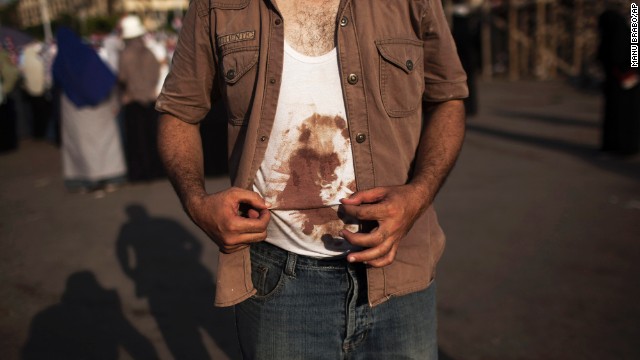 A Morsy supporter shows his bloodied shirt during a July 4 rally near the University of Cairo.
A Morsy supporter shows his bloodied shirt during a July 4 rally near the University of Cairo.  A young Egyptian boy shoots off fireworks during celebrations in Tahrir Square on July 4.
A young Egyptian boy shoots off fireworks during celebrations in Tahrir Square on July 4. 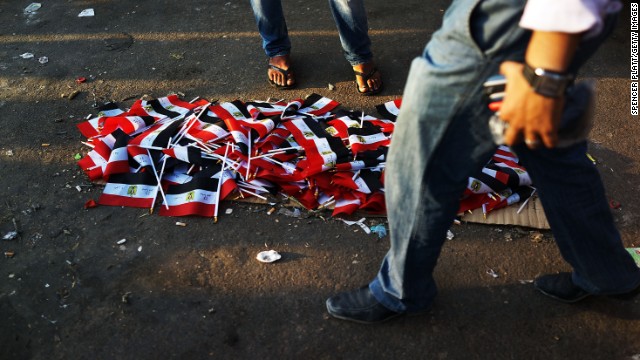 People walk by a pile of Egyptian flags for sale in Tahrir Square on July 4.
People walk by a pile of Egyptian flags for sale in Tahrir Square on July 4. 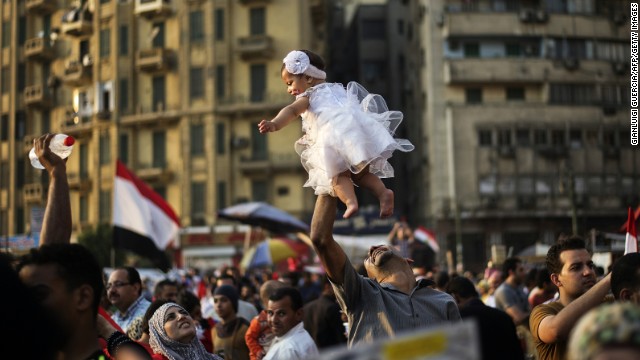 Crowds throng Tahrir Square on July 4.
Crowds throng Tahrir Square on July 4. 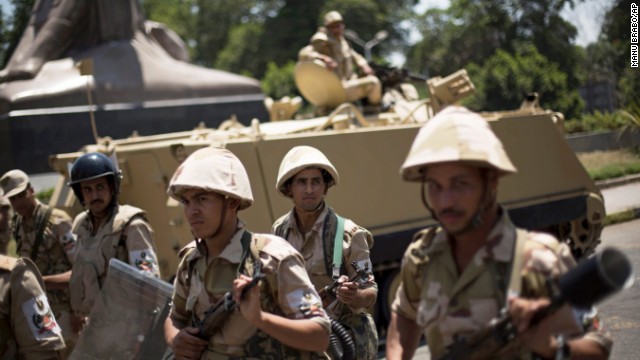 Egyptian soldiers deploy near Cairo University on July 4.
Egyptian soldiers deploy near Cairo University on July 4. 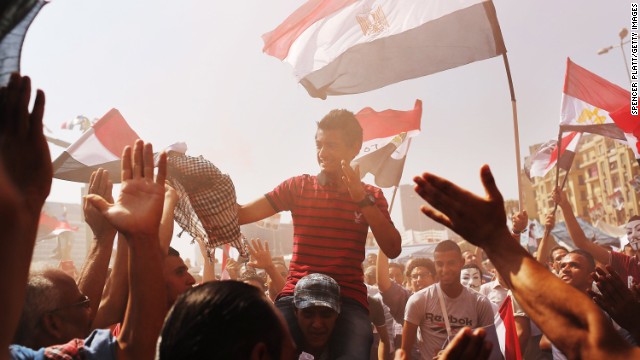 People dance and cheer at Tahrir Square in Cairo on July 4.
People dance and cheer at Tahrir Square in Cairo on July 4. 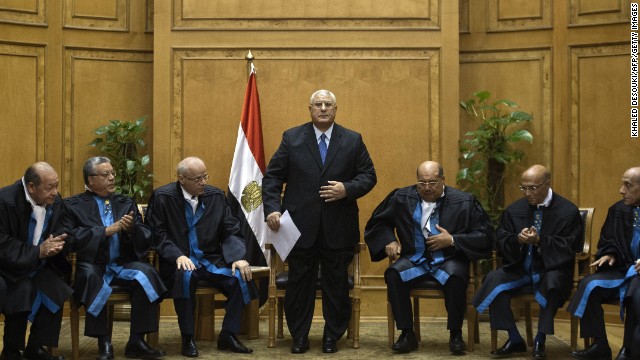 Adly Mansour, center, stands after delivering a speech during his swearing-in ceremony as Egypt's interim president in the Supreme Constitutional Court in Cairo on July 4. Mansour has served as the head of the country's Supreme Constitutional Court.
Adly Mansour, center, stands after delivering a speech during his swearing-in ceremony as Egypt's interim president in the Supreme Constitutional Court in Cairo on July 4. Mansour has served as the head of the country's Supreme Constitutional Court. 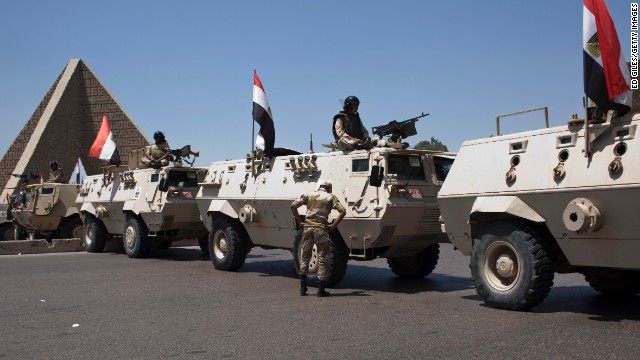 Armored vehicles with the Egyptian army sit at a checkpoint in the Cairo district of Nasr City on July 4.
Armored vehicles with the Egyptian army sit at a checkpoint in the Cairo district of Nasr City on July 4. 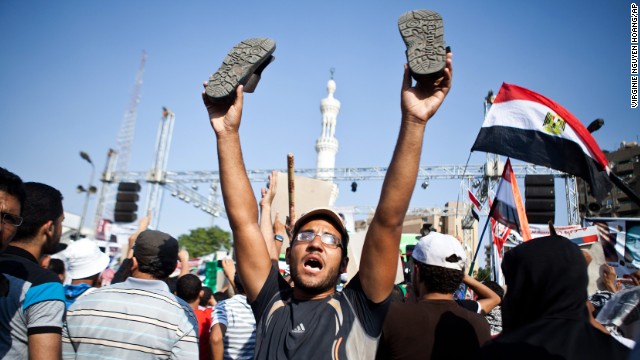 A Morsy supporter reacts as a military helicopter flies over during a July 4 rally in Nasr City.
A Morsy supporter reacts as a military helicopter flies over during a July 4 rally in Nasr City. 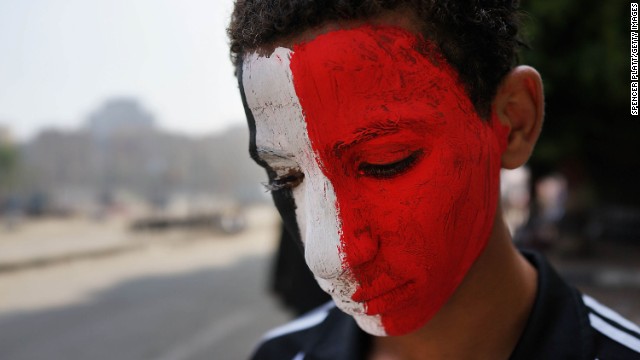 A boy with face paint the color of the Egyptian flag pauses on July 4 in Tahrir Square.
A boy with face paint the color of the Egyptian flag pauses on July 4 in Tahrir Square.  A pedestrian shakes hands with a member of the military at a roadblock in Giza.
A pedestrian shakes hands with a member of the military at a roadblock in Giza. 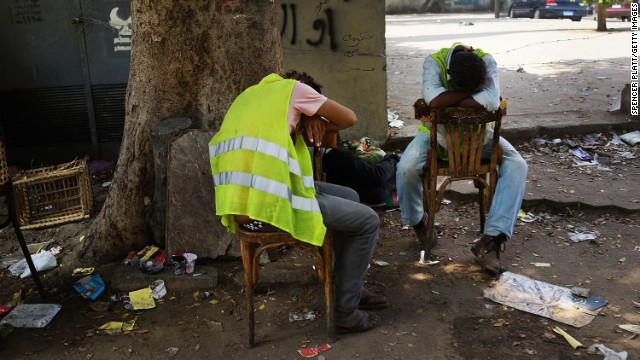 Security personnel rest on July 4 in Tahrir Square.
Security personnel rest on July 4 in Tahrir Square. 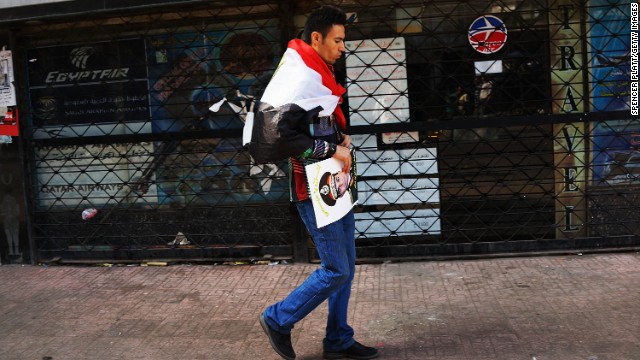 A man walks to Tahrir Square on July 4.
A man walks to Tahrir Square on July 4. 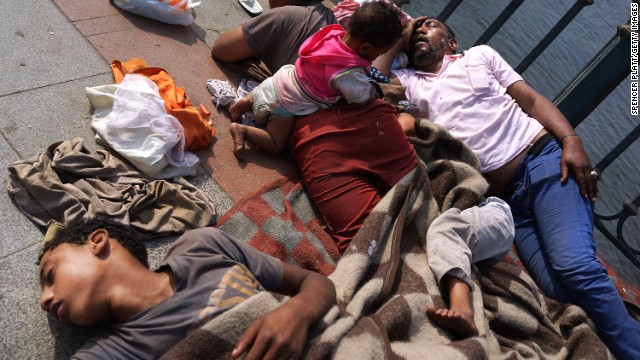 A family sleeps on a bridge near Tahrir Square on July 4.
A family sleeps on a bridge near Tahrir Square on July 4. 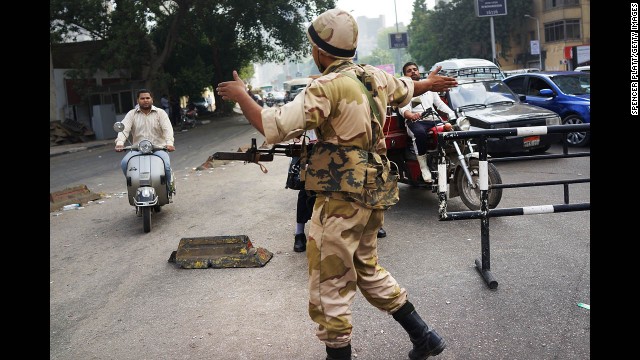 A member of the Egyptian military redirects traffic on July 4 at a roadblock in Giza.
A member of the Egyptian military redirects traffic on July 4 at a roadblock in Giza. 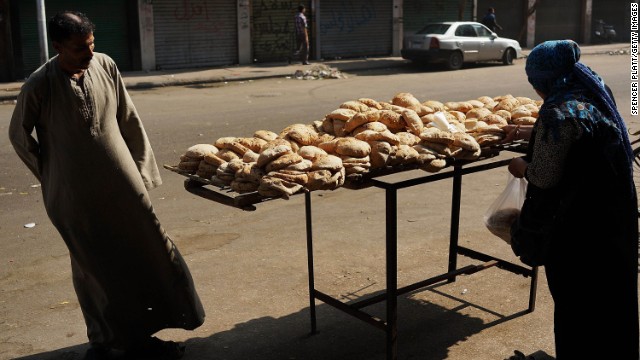 Bread is sold near Tahrir Square on July 4.
Bread is sold near Tahrir Square on July 4. 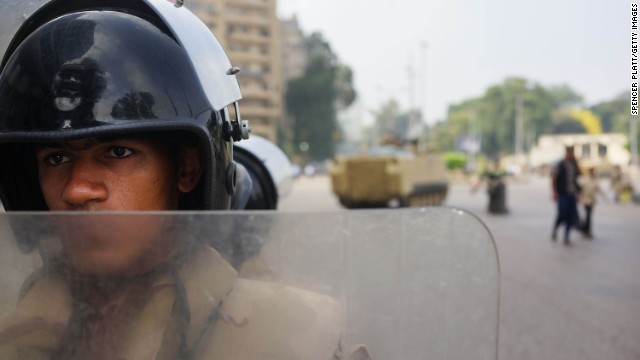 An Egyptian military member guards a roadblock in Giza on July 4.
An Egyptian military member guards a roadblock in Giza on July 4. 
1

2

3

4

5

6

7

8

9

10

11

12

13

14

15

16

17

18

19

20

21

22

23

24

25

26

27

28

29

30

31

32

33

34

35

36

37

38

39
- Tamara Cofman Wittes: U.S. must nudge Egypt back on path toward democracy
- Wittes: Morsy's uncompromising approach was big sign that trouble was brewing
- Wittes: Islamist party candidates have a right to run in elections
- She urges the U.S. to cut off aid to Egypt as incentive to hold new democratic elections
Editor's note: Tamara Cofman Wittes is senior fellow and director of the Saban Center for Middle East Policy at Brookings Institution. Follow her on Twitter: @tcwittes
(CNN) -- The ouster of Mohamed Morsy as Egypt's president is unlikely to end the country's political turmoil. As a result, the United States -- which has great stakes in Egypt's stability -- must use its limited leverage to nudge Egypt back onto a democratic trajectory.
The lesson of Egypt's 2011 revolution was that lasting stability demands an inclusive government that is accountable to Egypt's people and responsive to their demands for dignity and freedom. But Morsy and his Muslim Brotherhood apparently didn't get the memo.
Many Egyptians were already skeptical of the Brotherhood -- but Morsy's "my way or the highway" approach to elections, the constitution, and other key issues, and his readiness to wield the old regime's repressive laws against his critics, alienated many more. For Washington, these moves should have raised alarm bells that Egypt was not on the track to stable democracy -- but the administration was slow to act as the political clouds gathered.

As the largest Arab state and key regional anchor, a stable Egypt is crucial, especially for a United States that wants to turn its attention elsewhere in the globe. But Washington must press to ensure that Egypt's next leaders don't repeat Morsy's mistakes.
The Muslim Brotherhood did well in elections partly because it captured years of pent-up protest votes -- but there is also a significant segment of the public who feel that the Brotherhood best represents them politically. They, too, have the right to form parties and support candidates that reflect their beliefs. Any attempt to ban Islamist parties, or to forcibly secularize the public sphere, will alienate not only Brotherhood members but all those Egyptians who tell pollsters that they believe politics should reflect the influence of Islam.
 Egyptian military takes CNN camera
Egyptian military takes CNN camera 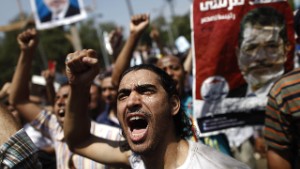 Clashes in Egypt turn deadly
Clashes in Egypt turn deadly 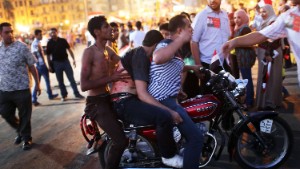 Violence in streets of Cairo after coup
Violence in streets of Cairo after coup The Brotherhood also has choices to make that could determine whether Egypt moves toward greater stability or toward civil strife. If the Brotherhood chooses to resist violently, the state has the capability to crush their efforts -- but the price will be heavy. Vulnerable Egyptians, including the country's religious minorities, are likely to be the greatest losers.
Even more troubling, deeply conservative Salafi movements only recently took the leap into formal politics -- but skeptically. Some of these groups have violent pasts. Now that democracy's been overridden in the name of defending "freedom," will they see a reason to stay in the political game? If followed by undue repression, this coup could drive the creation of a new generation of Islamist terrorists in Egypt. Egyptians have suffered enough from terrorism already.
Even if this military action to depose the elected president was a response to popular demand, that doesn't mean it wasn't a coup. It's certainly possible for a military coup to advance democratic development -- but it's rare, and the bar is pretty high.
The decisions announced by General Abdul Fatah el-Sisi place state authority back in the hands of three strong instruments of the old Mubarak regime: the army, the Interior Ministry and the judiciary. The Obama administration must use its influence with the Egyptian military to press for clear evidence that the new transitional authority will govern in a transparent, restrained manner, and move the country swiftly back to democratic rule. That should begin with a clear and swift timeline for a return to democratic rule.
The United States has a law on the books that demands an immediate cutoff of aid in the event of a military coup. The U.S. has sent an average of $2 billion a year in aid to Egypt since 1979.
The U.S. law is designed to give coup-established governments a strong incentive to return their countries to democratic rule -- aid can resume as soon as new democratic elections are held. The African Union, which has strengthened its democratic norms in recent years, has already suspended Egypt's membership because of the military's intervention into democratic politics. The U.S. law should be invoked in the Egyptian case, and used to hold the Egyptian military accountable for swift progress on their transition road map.
Follow us on Twitter @CNNOpinion.
Join us on Facebook/CNNOpinion.
The opinions expressed in this commentary are solely those of Tamara Cofman Wittes.







